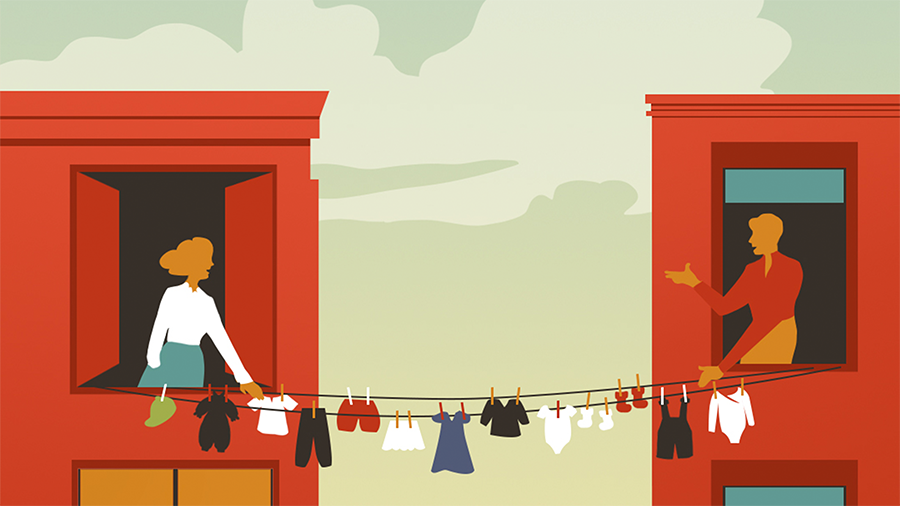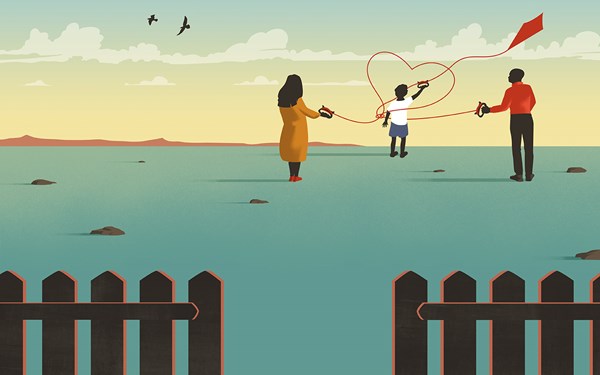How to help children deal with divorce or separation

Separation and divorce aren’t easy.
There may be bad feelings between the parents and their families. Children can pick up on this, which may confuse or upset them, or even lead to them blaming themselves for a break-up. It's important to empathise with them.
To support children during a separation and help them with their worries, you should:
- remind them that both parents love them
- be honest when talking about it, but keep in mind the child's age and understanding
- avoid blame and don't share any negative feelings the adults have about each other
- keep up routines, such as going to school and having specific mealtimes and bedtimes
- let them know they can talk about their feelings with you – explain that it's OK to be sad, confused or angry
- listen more than you speak – asking questions will help them to open up.
There are lots of ways to make it a bit less painful when talking to children about divorce or any other difficult subject. We’ve got more advice for parents in our guide for talking about difficult topics.
Childline
Sometimes children find it hard to talk to the people around them about their parents separating. Remind them they can always contact Childline by phoning 0800 1111 or having a 1-2-1 chat online.
Who has parental responsibility?
In general, mothers automatically have parental responsibility for their child from birth.
Fathers usually have parental responsibility for the child if they:
- were married to the child's mother
- are listed on the child's birth certificate.
If both parents have parental responsibility, the child's wellbeing is both their responsibility. This is the case until the child turns 18.
Learn more about parental rights and responsibilities on the UK Government website.
How to agree on child contact

Children tend to do best when they have contact with all parents. And they have the right to maintain contact with them, unless it's not in their best interest.
There are three ways to decide who a child lives with and how visits will work.
Contact arrangements
A 'contact arrangement' clarifies who the child lives with and when they can see the parent they don’t live with.
Contact arrangements should be discussed and decided by the parents. They should always focus on what's best for the child, not what's best for the parents.
If possible, this decision should happen without going to court. A court process can be distressing, costly and lengthy.
If parents are finding it difficult to agree on arrangements, the National Association of Child Contact Centres may be able to help. Contact centres provide a friendly, safe and neutral environment for parents and other family members to meet their child(ren). They can meet without the parents having to meet.
Family mediation
If parents can't agree on contact arrangements, the next step is 'family mediation'. This can help end disagreements without needing to go to court.
A mediator is an independent, trained professional who can help parents come to an agreement. They can explain the laws supporting the agreement.
Parents may be able to get legal aid for mediation, meaning they don't need to pay the mediator's fees. Find out more from the Family Mediation Council.
Sometimes mediation doesn't work. That might be because one parent doesn't agree to attend the sessions, or because the parents can't make an agreement with the mediator's help.
Child Arrangement Order
If mediation fails, either parent can apply through the courts for a Child Arrangement Order (previously known as a Contact Order). This should always be a last resort.
Before making an application, parents will need to:
- prove they’ve tried mediation;
- get legal advice from a lawyer specialising in family law; or
- visit their local Citizens Advice.
A Child Arrangement Order is a legal agreement that says:
- who the child lives with;
- who will have contact with the child; and
- how often and for how long the contact visits will be.
The court will only make an Arrangement Order if they believe it would be better for the child to do so.
Before they can see a judge, the family will be given a Children and Family Court Advisory and Support Service (Cafcass) officer. The Cafcass officer will work with the family to understand any risks to the children and consider whether a decision can be made through mediation.
How courts decide on child contact
Every child and set of circumstances is different. But in every situation, the child's welfare must be put first. When deciding on contact and residence, the courts focus on a number of key factors, such as:
- the wishes and feelings of the child
- any harm or risk of harm
- the child's physical, emotional and educational needs
- the likely effect of any change in the child's circumstances
- the child's age, sex, background and characteristics
- the ability of each parent to meet the child's needs.
What does the law say about child contact?
A child can't be forced to see the non-resident parent but if there's a court order in place, the resident parent must follow the agreed arrangements.
It's really important that you ask your child and explore what's bothering them before you think about stopping contact with a parent or another family member.
Parents should work towards helping the child feel safe and happy in their care. A child's feelings are important but contact should be encouraged as long as it does not place them at risk of harm.
If a young person doesn't feel their voice is being heard, they can contact an advocacy service such as NYAS, which helps young people in England and Wales express their wishes.
A Child Arrangement Order is legally binding and ensures that contact takes place between the child and non-resident parent. If the agreement is broken, then the parent who has breached the Order can be taken to court.
Contact should only be refused if the parent thinks their child is likely to come to harm during contact and they must be able to justify this in court.
Legally, yes – but children generally do better when they have contact with both parents (and their extended families). Parents should consider what's best for the child, not for the parent.
If a parent feels they are being unfairly denied contact, they may consider seeking legal advice.
Grandparents have no automatic rights to have contact with a child after a family break-up. However, agreements can usually be reached with the parents.
If this doesn't happen, you could contact Kinship, who support all kinship carers such as grandparents, aunts, uncles and family friends, who care for children.
Every pound helps us support children
Other organisations you can talk to
The Coram Children's Legal Centre offers free information and advice on all aspects of the law relating to young people.
You can also get help from these organisations:
- Families Need Fathers champions the child's relationship with both parents during and after family separation.
- Gingerbread provides support for single parents in England, Wales and Northern Ireland. One Parent Families provides this service in Scotland.
- Relate provides mediation and family counselling. They also offer advice on understanding children's feelings and behaviour during separation.
- Family Lives (England and Wales), Children 1st Scotland and Parenting Northern Ireland provide professional, non-judgemental advice to all family members to help achieve the best outcome for everyone.
- The Scottish Child Law Centre gives legal advice for and about children.
- Children 1st supports families in Scotland.
- Citizens Advice can give advice to parents if their relationship breaks down.
More support for parents
Illustration credits
Top banner and page body illustrations by Ana Yael.
Parenting advice row: see individual pages for details.





